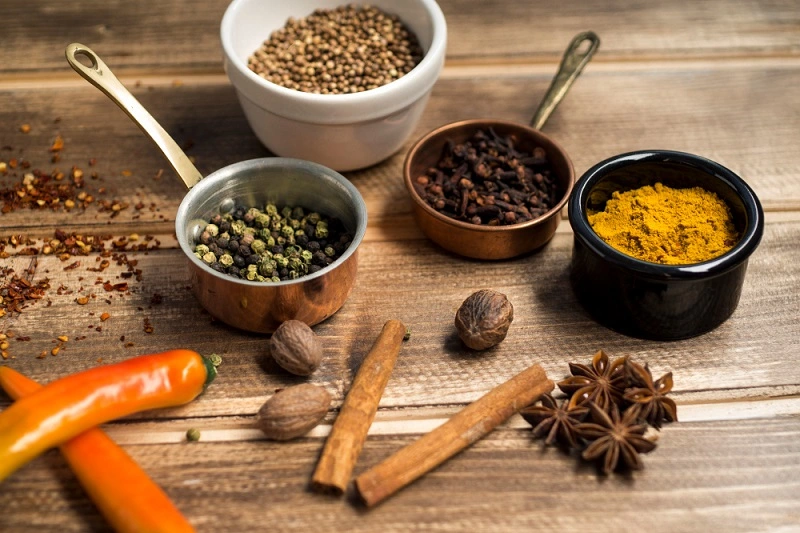In the lush green landscapes of Kerala, a treasure trove of spices thrives, adding vibrancy to its culinary heritage and global spice trade. Renowned as the “Spice Garden of India,” Kerala boasts a diverse range of aromatic spices that have enchanted palates for centuries. From the fiery warmth of black pepper to the delicate fragrance of cardamom, each spice tells a story of its own, deeply intertwined with the state’s history, culture, and economy.
Exploring the Rich Tapestry of Spices Cultivated in Kerala
Kerala’s unique geographical features, including its tropical climate, fertile soil, and abundant rainfall, provide the perfect conditions for cultivating a wide array of spices. Let’s embark on a flavorful journey through some of the quintessential spices that find their home in this enchanting land:
Black Pepper
Known as the “King of Spices,” black pepper holds a prominent position in Kerala’s spice repertoire. Cultivated extensively in the Malabar region, it lends a distinctive pungent flavor to dishes worldwide. The pepper vines winding around wooden stakes or trees are a common sight in Kerala’s spice plantations.
Cardamom
Kerala produces a significant portion of the world’s cardamom, prized for its sweet fragrance and warm, slightly citrusy flavor. The misty hills of the Western Ghats, particularly in places like Munnar and Wayanad, provide the ideal conditions for growing this precious spice.
Turmeric
With its vibrant yellow hue and earthy taste, turmeric is not just a spice but also a revered ingredient in Ayurveda. Kerala’s fertile soil yields high-quality turmeric, which is renowned for its medicinal properties and culinary uses. The spice finds its way into curries, stews, and traditional beverages like “golden milk.”
Cinnamon
Kerala’s cinnamon, known for its sweet and woody aroma, adds depth to both savory and sweet dishes. The state’s warm and humid climate fosters the growth of cinnamon trees, particularly in regions like Idukki and Kottayam.
Cloves
Prized for their intense flavor and aroma, cloves are an integral part of Kerala’s spice heritage. These aromatic flower buds thrive in the state’s humid conditions, contributing their warm, slightly bitter taste to various dishes, including biryanis and meat curries.
Nutmeg and Mace
Kerala’s fertile soil and tropical climate create an ideal environment for nutmeg and mace cultivation. These sibling spices, derived from the same fruit, impart a warm, nutty flavor to both sweet and savory delicacies. The town of Pala in Kerala’s Kottayam district is renowned for its nutmeg plantations.
Ginger
Kerala’s ginger, with its robust flavor and pungent aroma, is a staple in both traditional and contemporary cooking. The spice is cultivated across the state, with notable production centers in regions like Kozhikode and Thrissur.
Vanilla
While vanilla is primarily associated with exotic locales like Madagascar, Kerala also boasts a thriving vanilla industry. The state’s warm climate and ample rainfall provide optimal conditions for vanilla cultivation, particularly in the districts of Ernakulam and Idukki.
Fenugreek
Kerala’s fenugreek, prized for its distinctive bitter taste and aromatic seeds, adds depth to curries, pickles, and spice blends. The spice thrives in the state’s fertile soil and is cultivated in various regions, including Palakkad and Alappuzha.
Mustard
Mustard cultivation has been an integral part of Kerala’s agricultural landscape for centuries. The pungent flavor and aroma of Kerala’s mustard seeds enhance the taste of pickles, curries, and condiments, with cultivation hubs scattered across the state.
The cultivation of these spices not only adds flavor to Kerala’s cuisine but also plays a significant role in its economy. Kerala’s spice trade has a rich history dating back to ancient times when traders from around the world frequented its shores in search of these precious commodities. Today, the state continues to be a major exporter of spices, contributing to India’s position as a global spice powerhouse.
In recent years, Kerala’s spice industry has witnessed a resurgence, fueled by increasing global demand for high-quality, organic spices. With a growing emphasis on sustainability and fair trade practices, Kerala’s spice farmers are embracing innovative techniques to cultivate these precious crops while preserving the region’s rich biodiversity.
In conclusion, Kerala’s spices represent not just a culinary delight but also a cultural legacy deeply rooted in the soil of this enchanting land. From the mist-covered hills of Munnar to the backwaters of Alleppey, the aroma of these spices wafts through the air, tantalizing the senses and beckoning travelers to explore the flavors of “God’s Own Country.”
Through sustainable cultivation practices and a commitment to quality, Kerala continues to uphold its reputation as a beacon of spice excellence, enriching palates and livelihoods alike. So, the next time you savor a dish seasoned with Kerala’s spices, remember the centuries-old tradition and craftsmanship that goes into each aromatic treasure.


